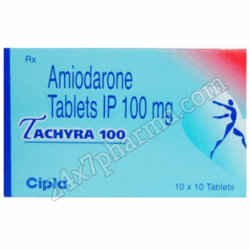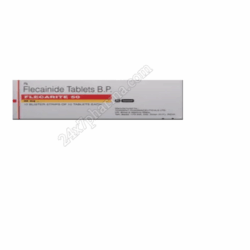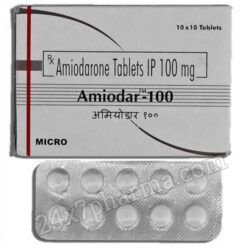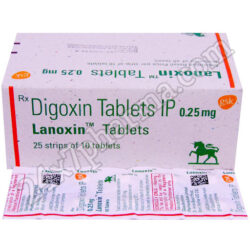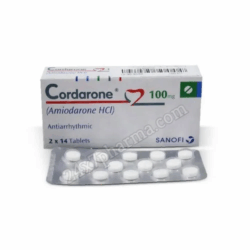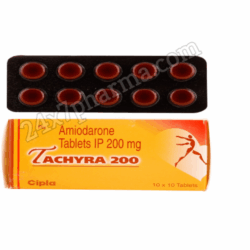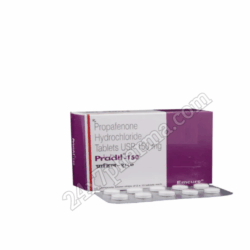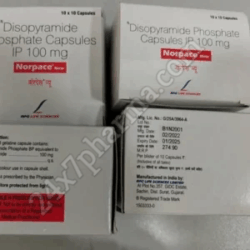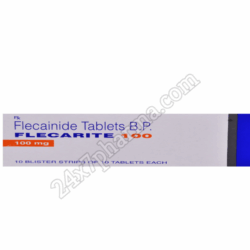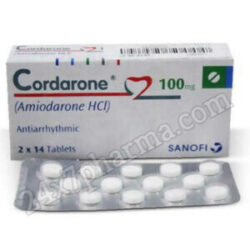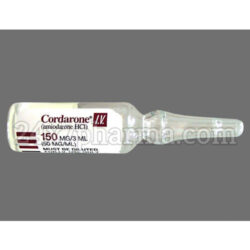Arrhythmias
Showing all 11 resultsSorted by latest
Tachyra 100mg Tablet 30’S
Original price was: $10.$8Current price is: $8.Flecarite 50mg Tablet 20’S
Original price was: $20.$16Current price is: $16.Amiodar 100mg Tablet 30’S
Original price was: $11.$9Current price is: $9.Lanoxin 0.25mg Tablet 30’S
Original price was: $7.$6Current price is: $6.CORDARONE 100mg Tablet 30’s
Original price was: $11.$9Current price is: $9.Tachyra 200mg Tablet 30’S
Original price was: $17.$15Current price is: $15.Pradil 150mg Tablet 10’S
Original price was: $18.$15Current price is: $15.NORPACE NEW Capsule 10’s
Original price was: $15.$13Current price is: $13.Flecarite 100mg Tablet 10’S
Original price was: $19.$16Current price is: $16.Cordarone X Tablet 30’S
Original price was: $21.$18Current price is: $18.Cordarone Injection 3ml (3 Vials)
Original price was: $13.$11Current price is: $11.Arrhythmias can be described as an irregular heartbeat. When arrhythmias are present, there is an abnormal heart rhythm which could cause the heart to beat too quickly, too slowly, or in a different way. This may cause symptoms such as heart pains, lightheadedness, and shortness of breath.
The causes of arrhythmias are many causes, such as cardiac conditions, electrical issues in the heart, certain medications, or excessive alcohol drinking.
Treatment for arrhythmias generally involves addressing the causes, if there is a possibility. If arrhythmias remain untreated they could lead to severe complications such as stroke or even sudden death.
Types of Arrhythmias
There are a variety of kinds of arrhythmias. However, they are generally classified into two groups: fast arrhythmias as well as slow arrhythmias. Arrhythmias that are fast cause the heart to beat too fast.
The most commonly used kind of arrhythmia that is fast is known as supraventricular Tachycardia (SVT). SVT is a sign of an electrical malfunction in the chamber that is located in the top of the heart (the atria).
The heart is then able to beat extremely fast and can be as high as 200 beats per minute. Although SVT is not usually life-threatening, it may be accompanied by symptoms like headache, chest discomfort, and shortness of breath.
Slow arrhythmias cause the heartbeat to be too slow. The most commonly used slow arrhythmia type is known as bradycardia. Bradycardia happens the fact that the electric system controlling the heart’s rhythm isn’t functioning correctly.
This could cause the heart to beat at a rate of thirty beats every minute. Although it is possible for bradycardia to be benign, it can result in serious complications, such as stroke or even sudden death.
Causes of Arrhythmias
The causes of arrhythmias are many causes, such as heart diseases, electrical problems that affect the heart, specific medication, and over-alcoholic drinking. The most commonly reported causes of arrhythmias are:
- Coronary arterial artery disease
- Heart attack
- Heart failure
- High blood pressure
- Diabetes
- Sleep Apnea
- Excessive alcohol use
- Certain medicines (e.g. beta blockers,)
- A heart electrical problem can be caused by electrical problems.
Treatment for Arrhythmias
The treatment for arrhythmias is based on the kind of arrhythmia and the underlying causes. In certain cases, it is not needed if the arrhythmia is uninvolved and is not associated with any symptoms.
If the arrhythmia causes symptoms or may be life-threatening, treatment may be required. Treatment options for arrhythmias are changes in lifestyle (e.g. quitting smoking cigarettes) and medication (e.g. beta blockers, beta-blockers) and surgical procedures (e.g. the placement of a pacemaker) and catheter ablation (a minimally-invasive procedure utilized to eliminate abnormal tissue within the heart).
Arrhythmias is a kind of heart rhythm disorder that is characterized by an irregular heartbeat. There are many types of arrhythmias. However, they are generally classified into two groups that are fast arrhythmias and slow arrhythmias.
Arrhythmias that fast make the heart beat quickly and slow arrhythmias are those that cause the heart to beat too slowly. Arrhythmias can result from many reasons, such as heart disease and electrical issues with the heart and blood vessels, specific drugs, or excessive drinking.
Treatment for arrhythmias usually involves fixing the root of the problem, if that is it’s possible. If not treated, arrhythmias may lead to serious complications, such as stroke, or even sudden death.

